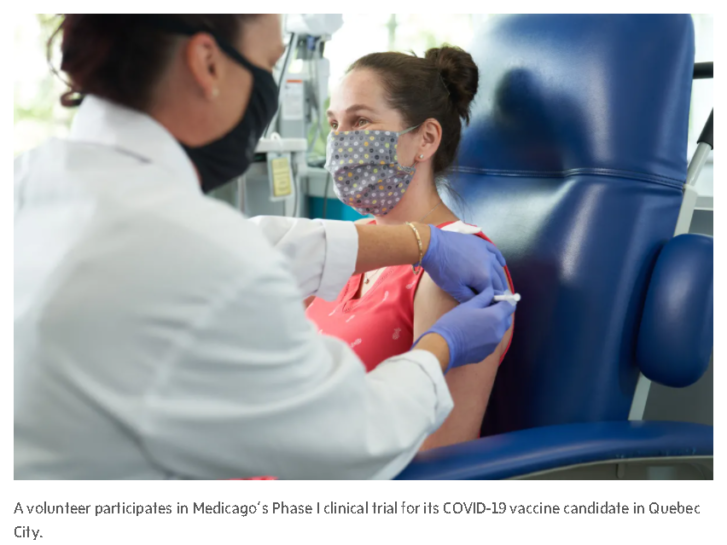A vaccine developed by Quebec-based Medicago Inc. has shown greater than 70-per-cent efficacy against a range of COVID-19 variants in a large-scale clinical trial, the company said on Tuesday.
The outcome bolsters Medicago’s bid to become the first COVID-19 vaccine maker in Canada to get a product to market for use either as a booster shot or as a first vaccine in places that remain critically unprotected from the disease.
“When we got the results the first reaction was, thank God it works. We were absolutely delighted,” said Brian Ward, Medicago’s medical officer and a professor of medicine and microbiology at McGill University in Montreal. Earlier-stage trialswith hundreds of participants suggested the vaccine was safe and that it generated an immune response, but it had to be tested with a much larger group of people in order for researchers to measure its efficacy.

Dr. Ward said the results should not be compared directly with figures released last year by Pfizer-BioNTech and Moderna duringthe clinical trials for their vaccines. Both showed greater than 90-per-cent efficacy. But those trials were conducted before COVID-19 variants of concern were widespread. The variants have presented vaccineswith a somewhat different pathogen than the one they were designed to fight.
“In the variant world, 70 to 75 per cent is a really good vaccine,” Dr. Ward said.
The randomized controlled Phase 3 trial, which got under way in March, involved 24,000 participants. More than two-thirds were located in Brazil and Argentina, and the rest were in the U.S., Mexico, Canada and Britain. Half of those who participated received the Medicago vaccine in two doses separated by 21 days. The other half received a placebo.
Overall, the results showed the vaccine to have 71-per-cent efficacy against all variants that were circulating in the study populations at the time. Its efficacy against the Delta variant, which is currently dominant in Canada, was 75.3 per cent. The efficacy was 88.6 per cent against the Gamma variant. The Omicron variant, now a focus of global concern, had not yet made its appearance when the trial was under way. Information about the vaccine’s efficacy against the new variant may emerge as data continue to accumulate.
As with other vaccine trials, the results of this one come with a level of statistical uncertainty. The real efficacy numbers could be as much as 12 per cent higher or lower in some cases. And the trial did not seek to recruit elderly individuals, because of the growing certainty that high-risk groups would have access to approved vaccines while the research was under way. Among those who participated, only three severe cases of COVID-19 emerged, and all of them were in the placebo group.
Participants reported mild to moderate side effects, including soreness, particularly after receiving second doses. The researchers observed no moreserious adverse outcomes in the participants who received the vaccine than they did in the placebo group.
Health Canada has been reviewing Medicago’s data throughout its clinical trials. The company will soon be handing over its final data to the regulator, Dr. Ward said.
Last year, Canada ordered 20 million doses of Medicago’s vaccine with an option to buy an additional 56 million. That was before it was clear which vaccines, if any, would be effective and available as a defense against the pandemic. Now, 12 months later, Medicago’s shot is poised to enter a crowded field.
“It’s going to be an effective vaccine. It’s going to be a useful vaccine … The key question is how does it compete,” said Scott Halperin, an immunologist and director of the Canadian Centre for Vaccinology in Halifax.
Health Canada has already approved four COVID-19 vaccines, including the mRNA vaccines produced by Pfizer-BioNTech and Moderna and the viral vector vaccines made by AstraZeneca and Johnson & Johnson. All four are designed to deliver genetic material, either RNA or DNA, that cells in the body take up and use to replicate proteins of the COVID-19 coronavirus. These in turn alert the immune system.
In contrast, Medicago’s vaccine works by delivering the proteins directly, in the form of small particles that mimic the appearance of the virus but cannot copy themselves. The vaccine is administered together with an adjuvant manufactured by GlaxoSmithKline, a U.K.-based pharmaceutical company, to help amplify the body’s immune response.
Dr. Halperin, who was on the data monitoring committee for Medicago’s initial small-scale trial in 2020, said the vaccine’s alternative mode of action may help persuade vaccine-hesitant people, some of whom cite discomfort with mRNA vaccines, to take the shot. But its main use in Canada may be as an extra dose to help maintain immunity among the vaccinated.
“My expectation would be that boosting with this vaccine would give you very good results,” Dr. Halperin said.
In addition to Heath Canada, the World Health Organization is evaluating Medicago’s vaccine for its COVAX initiative, which aims to distribute vaccines equitably to all countries.
Srinivas Murthy, a clinical associate professor of medicine at the University of British Columbia, said any effective vaccine would be a welcome addition from a global perspective.
“Everyone is going to need more vaccinations … especially in places that don’t have any vaccines – zero-dose places. I think we really need to focus on those.”
Article From: Globe and Mail
Author: IVAN SEMENIUK

